

News and Announcements
News & announcements, announcing new research network studies.
We are excited to share the launch of two new projects made possible by the generous support of the Heising-Simons Foundation .
Promoting Teacher-Child Relationships in Early Care and Education Classrooms- The National Center for Children in Poverty and The Straus Center, Bank Street College of Education have launched a teacher-research partnership project that will address empirical gaps in our understanding of how teachers perceive teacher-child relationships and factors that contribute to their quality. The research will engage teachers in experiences that may increase their capacity to become more aware of how they view children, their relational behaviors with different children, and their role in contributing to the quality of their relationship with individual children.
Researcher Team
Sheila Smith, PhD (PI)
Cristina Medellin, PhD (Co-PI)
Mark Nagasawa , PhD (Co-PI)
Sarika Gupta, PhD (Co-PI)
READ MORE HERE ON THE PROJECT PAGE.
Building the New York State Early Intervention Workforce: Institutions of Higher Education (IHE) Requirements of Interdisciplinary Personnel Development and Preparation - Brooklyn College of CUNY, will bring together highly qualified New York Early Intervention Higher Education faculty in Speech-Language Pathology (SLP) and Occupational Therapy (OT), to collaborate with the New York City Department of Health and Mental Hygiene's Bureau of Early Intervention (NYC DOHMH BEI), the New York State Early Childhood Advisory Council (ECAC), and the New York State's Department of Health's Bureau of Early Intervention (NYS DOH BEI) through the New York State Early Intervention Coordinating Council’s (SEICC) Workforce Capacity Taskforce.
Jacqueline D. Shannon, MSEd, PhD (PI), Brooklyn College, CUNY
Michael Bergen, AuD, FAAA, CCC-A (Co-Investigator), Brooklyn College, CUNY
Sharon Beaumont-Bowman, SLPD, CCC-SLP (Co-Investigator), Brooklyn College, CUNY
Beth Elenko, PhD, OTR/L, BCP, CLA, FAOTA (Co-Investigator), New York Institute of Technology
Karen McFadden, MA, PhD (Co-Investigator), Brooklyn College, CUNY
READ MORE HERE ON THE PROJECT PAGE
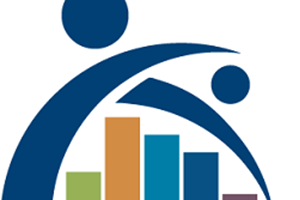

- Why It Works
- Join our Team
- Career Development Center
- Informal Family Child Care Project
- New York Works for Children
- QUALITYstarsNY
- NYC Early Childhood Research Network
- Leadership Initiative
- CAPS Online Support
- Career Development & Advising
- Gender, Sexuality and the Family Workshops
- Workshops and Events
- Institute Coaching
- The Aspire Registry / PD Finder
- Other Inquiries
- All Publications
- Institute Policy Briefs
- The Core Body of Knowledge
- The NYS Early Learning Guidelines
- The New York State Early Learning Standards
- The QUALITYstarsNY Standards
- Leadership Initiative Newsletters
- The Institute Blog
- The Aspire Registry Newsletter
- Early Childhood Research
- Early Childhood Degree Programs
- Certificates and Credentials
- Early Childhood Special Education Guide
- Professional Membership Organizations
- Regulatory Agencies and CCR&Rs
- Policy and Advocacy Organizations
- Scholarships & Financial Aid
- Fingerprinting
- Research Projects
- Early Childhood Scholars Rfp
Request for Proposals: Infant and Toddler Workforce Research
June 4, 2018.
The New York City Early Childhood Research Network (the Research Network) was established in 2015 to bring researchers and policymakers together to investigate and improve early childhood program quality in New York City. The Research Network is committed to generating actionable research that can provide timely data to help City officials with the implementation of New York City's early care and education system. In our work, we have three objectives: identify and promote research opportunities, disseminate research to inform policy and practice, and build the community and capacity of researchers in New York City dedicated to rigorous applied research to inform policy and practice. With initial investments from the Foundation for Child Development, eight research projects examining the implementation of PreK for All are underway. The New York Early Childhood Professional Development Institute, which facilitates the Research Network, has secured new funds for research focused on the NYC workforce that supports children from birth through age three.
In New York City, the infant and toddler workforce is vast. Our youngest children are routinely cared for in a wide variety of settings by people with a range of qualifications, education, and experience. In addition to parental care, children from birth through age three may be in informal care arrangements in which family members, friends, and neighbors provide care, or they may be in licensed family child care homes or community-based child care centers. Infants and toddlers may also receive early intervention, preschool special education, or home visiting services. The NYC Administration for Children's Services, Department of Health and Mental Hygiene, and the Department of Education all play significant roles in funding and administering these services and supporting the infant-toddler workforce. The funding available in this opportunity aims to contribute to the work of the City officials in these agencies as they strive to provide our youngest children with access to excellent care.
With this RFP, we intend to make two awards for research projects that deepen our understanding of the infant and toddler workforce. The Research Network has several principles that will inform our selection process. First, we are committed to rigorous research that produces actionable policy recommendations to support our City agency partners' work. Second, we believe that various forms of inquiry are needed to understand and improve the implementation of policy and we welcome qualitative, quantitative and mixed methods research proposals. Third, we are committed to collaboration and therefore grantees will be expected to share research protocols and deidentified quantitative data within the Research Network. Finally, we aim to build the City's research capacity to investigate and improve early childhood policy and therefore encourage proposals that include racially, linguistically, and socio-economically diverse research teams as well as early career scholars.
We are interested in supporting research projects that will address at least one of the following topics:
- Infant and toddler educators' and leaders' career pathways and professional development. Studies may provide descriptive data about qualifications, experience, and well-being of infant-toddler educators and identify effective interventions to build the qualifications of the infant-toddler workforce at scale. Studies may investigate all infant-toddler educators or focus on a segment of the workforce, such as home-based family child care provider and leaders.
- The quality and effectiveness of professional learning opportunities available for infant-toddler educators and leaders, in centers and/or in home-based family child care settings. In particular, studies may explore the Child Development Associate (CDA) credential, higher education coursework, coaching opportunities, and other interventions that aim to enhance infant-toddler quality and practice. Studies can explore relationships between interventions and quality measures and also identify strategies to expand access to effective strategies.
- Infant-toddler care quality: Studies may describe the quality of practice that infants and toddlers experience in New York City, including the identification of key measures of quality and the expertise and conditions that enhance quality.
- Early Intervention and preschool special education: Identify effective strategies to enhance Early Intervention referral rates and facilitate the transition between Early Intervention and preschool special education services.
- Families' decisions about infant-toddler care: Identify the factors that drive families' infant-toddler care choices, such as access and affordability, and how those factors differ by neighborhood characteristics and families' demographic backgrounds.
We expect to make awards decisions by September 15, 2018 and anticipate that data collection will begin in the fall of 2018. We intend to offer two awards that will range from $50,000 to $175,000. Awardees will need to enter into a sub-award agreement with the Research Foundation of CUNY.
We advise you to draft your application in Word and then cut/paste it into this application. The application fields are character-limited and include spaces. In general, 3,200 characters represent about one page, and 1,600 characters represent a half page. Brevity and clarity are appreciated. Therefore, it is not necessary to use the maximum allotted characters to answer each question.
All submissions are due by Wednesday, August 15th at 5pm EST

- Philanthropy News Digest

The New York City Early Childhood Research Network: A Model for Integrating Research, Policy, and Practice
Building a collaborative, multidisciplinary research network supports the implementation of effective programs by enabling researchers and policy makers set mutual goals, define shared metrics and protocols, collect meaningful data, and share various perspectives and learnings, a report from the Foundation for Child Development argues. The report, The New York City Early Childhood Research Network: A Model for Integrating Research, Policy, and Practice (31 pages, PDF), details the process of convening and funding the New York City Early Childhood Research Network in 2015 with the goal of studying the implementation of PreK for All, New York City’s expansion of full-day pre-K programs, and highlights elements of success and lessons learned. According to the report, the network has produced eight studies focused on the early childhood education workforce and has led to greater cooperation across sectors, coordination in research agendas, long-term collaboration, and enhanced understanding of program implementation. Recommendations for building an implementation research network include fostering shared decision making among policy makers and researchers, balancing the academic freedom of the researchers and the public dissemination of findings, and engaging an independent and neutral facilitator with established relationships with different stakeholders.
Related content

Yeshiva University receives $5 million for Jewish education program

Open Society announces 2022 Leadership in Government Fellows
Heinz endowments launches $10 million early childhood initiative, new york city health data initiative for health equity launched, featured research briefs.
A report from the Schott Foundation for Public Education found that, despite a commitment from education philanthropy funders to change grantmaking practices amid the racial justice protests of 2020, total grant dollars awarded in support of racial equity and racial justice work have declined compared to the years before 2020.
What aspect of education should philanthropic support prioritize?
- Racial equity initiatives
- Access to quality education for underserved communities
- Teacher training and support programs
- Student empowerment and leadership development
The nonprofit news you need
Get the latest nonprofit news, funding opportunities, job openings, and more delivered to your inbox with Philanthropy News Digest newsletters.
Candid gets you the information you need to do good.
To subscribe, select any of the newsletters listed below.
- RFP Bulletin
- Job Bulletin
- PND Connections
- Early Childhood Research & Innovation
Reflections by Research Network Scholars: Jillian Crosby

The New York City Early Childhood Research Network is a project of the New York Early Childhood Professional Development Institute . The Network brings together researchers, practitioners, and policymakers to collaborate, share knowledge, and generate actionable research. Researchers in the Network represent public and private universities in the metropolitan area as well as individuals from a variety of disciplines and research and practice backgrounds. Their work is instrumental in developing policy for young children. The Research Network invited some of its members to share about their career paths so far, and their future plans. The hope is to showcase the wide range of journeys taken by scholars in our field of early childhood.
Jillian Crosby, Borough of Manhattan Community College
At the age of 15, I thought I was going to be a criminal prosecutor. I volunteered at a local daycare center in Jamaica, Queens and it changed the trajectory of my life. The spark in children’s eyes once they mastered a task, the comradery between staff, relationship based practices grounded in family traditions and love of learning this program provided was the catalyst for a lifelong journey in early childhood education.
When I became a practitioner, things were not as easy as imagined. As a first-year teacher I struggled to manage 18 children, a first year Teaching Assistant, providing a high-quality classroom environment, and satisfying conflicting mandates from the Administration for Children’s Services, the Department of Health and Mental Hygiene, and Head Start on what seemed to be bi-weekly basis. I wanted to quit! Through networking, mentorship and experience I was able to find a healthy balance; but the struggle was still ever-present for myself and almost every other teacher I knew. Then I questioned how often great teachers transition to another profession due to this same frustration. This redirected my focus to helping practitioners embrace and master their multitude of responsibilities as a classroom teacher serving young children and families. To do so, I explored other options such as early intervention and teaching in Taiwan to expand my scope of education. As a director, professional development facilitator, professor of teacher education and researcher I have used multiple avenues to impart my knowledge and experiences to undergraduate Early Childhood Education (ECE) students and practitioners in the field.
My current research, which examines the course content in New York State undergraduate ECE programs to prepare preservice teachers to work with infants, toddlers and families highlights the need for continued work in supporting teachers before and after they enter the classroom. Based on our findings , three recommendations that can perpetuate a lasting cycle of support are: increasing Higher Education (HE) faculty capacity and knowledge of infant toddler care and education based on our Essential Elements for Undergraduate Early Childhood Education Preservice Programs to Prepare Infant-Toddler Educators, include infant toddler fieldwork experiences for pre-service teachers and continued professional development for practitioners in the field.
The Research to Practice series webinar: “Where are the Babies?” and the Infant-Toddler Summer Symposium for New York state ECE faculty each have allowed HE faculty and ECE center administrators to explore the research, share their wealth of knowledge and inhibitions when working with preservice or practicing teachers and grow as a community to strengthen the ECE workforce. Presenting our research to the NYS Board of Regents and other New York City stakeholders is a step in the direction of true change through policy.
Once a practitioner, always a practitioner; and my research will be reflective of this. Moving forward, I would like to continue this research on a broader scale. Next steps are to examine the course content of ECE undergraduate programs in the tri state area, then nationally. My interests also lend to the exploration of professional development opportunities and other support services available for first year teachers.
It sounds cliché, but I believe the children are our future. We must ensure teachers are capable and qualified to perform the delicate work of care and education and can confidently implement pedagogy and policy.
Throughout this amazing journey in the field of education one thing is clear; to really execute change, you must follow the hierarchy of educational leadership and that is what I intend to do. As I begin the Urban Education PhD program at the Graduate Center in the Fall, the inspirational words of Maya Angelou reign: “Still I rise!”
Jillian Crosby is an Adjunct Lecturer at the Borough of Manhattan Community College.
Related Articles
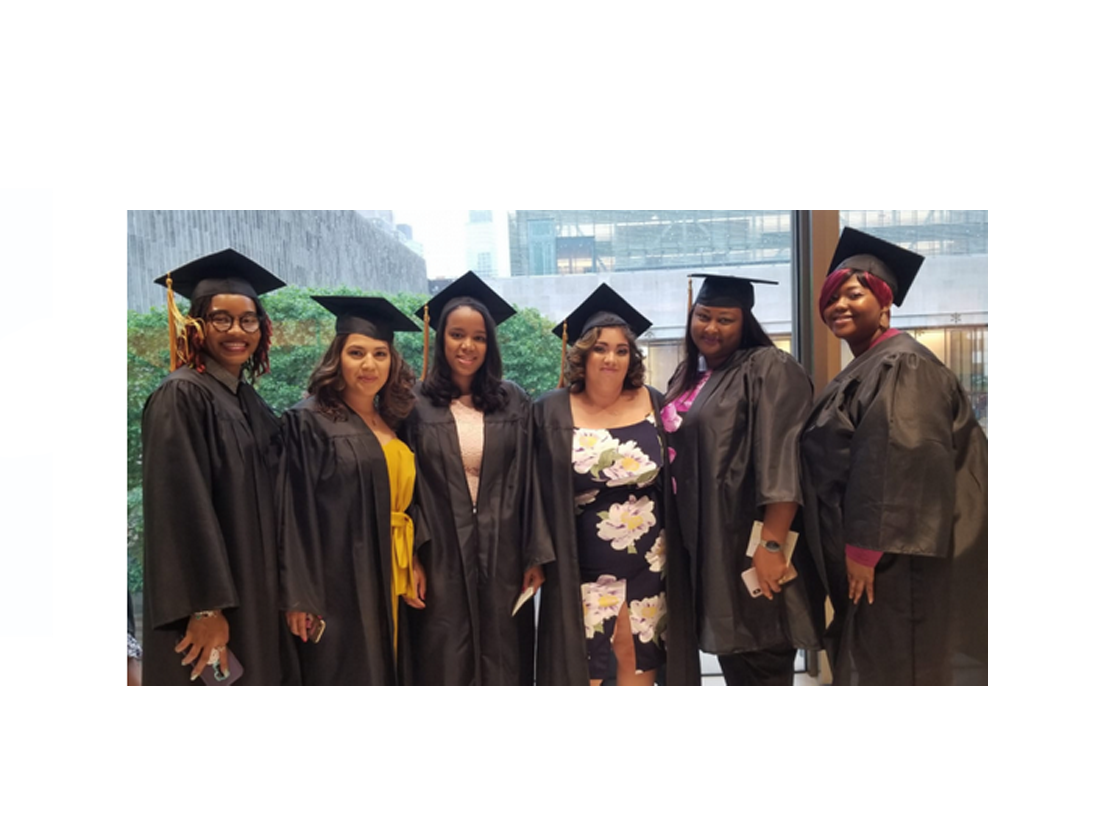
A Special CDA Program at CUNY
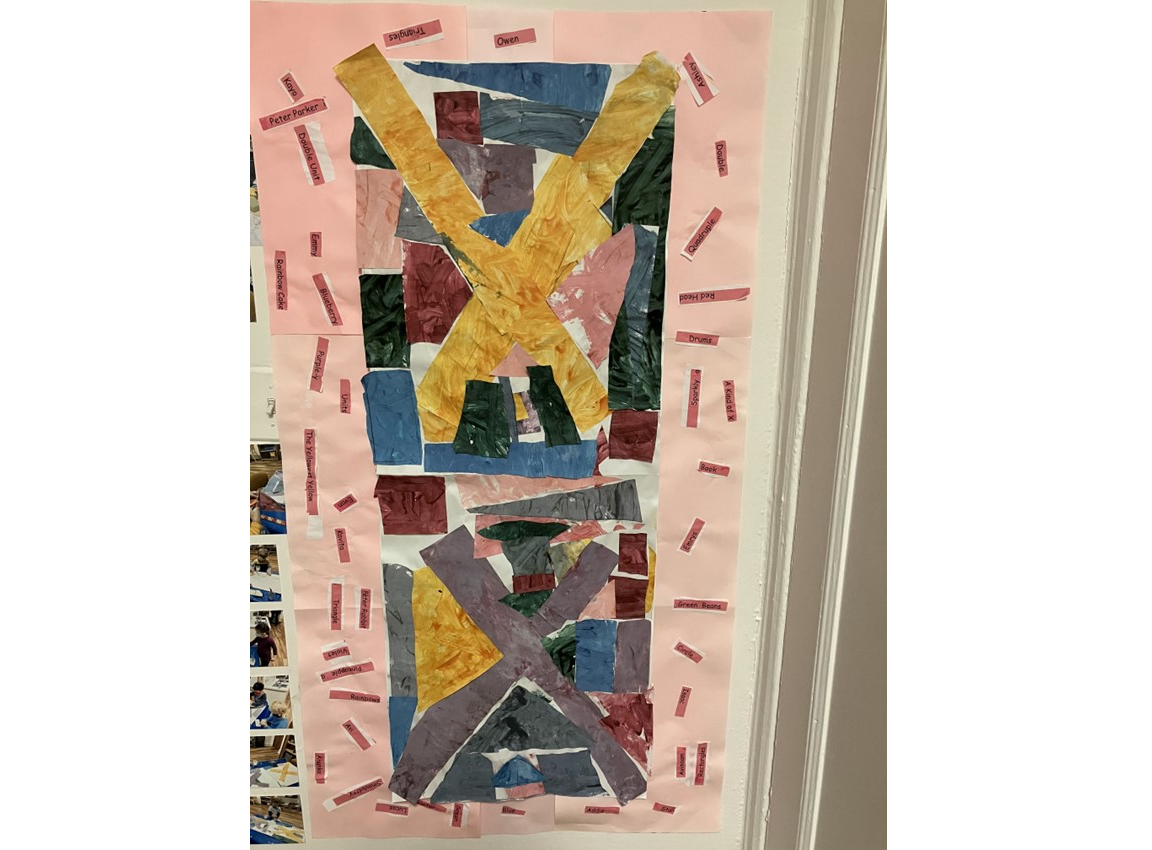
Teaching For Social Justice Through Public Art
Gender, sexuality, and the family: fall trainings, 5 thoughts on “ reflections by research network scholars: jillian crosby ”.
An inspiring journey! Thank you for sharing.
I love this! Reading this as a first-year teacher is so helpful to me. It has been a pleasure to be your student, and you are so inspiring to me! ❤️
WoW ❗️❗️❗️ So very proud of you Jill-Will. Looking forward to calling you Dr B
I am so very, very proud of you. This is an excellent article! Your passion for children, education, and change has always been heartwarming, and promising. ♥️
WOW!!. YOU NAILED IT. SOOOOOOO PROUD OF YOU. OF COURSE, I’LL To READ IT AGAIN. HOPEFULLY, NOT THROUGH BLEARY EYES. IN JOYFUL TEARS, RIGHT NOW.
Leave a Reply
Your email address will not be published. Required fields are marked *
Save my name, email, and website in this browser for the next time I comment.

- Create account
Search form
- Vision, Mission and Values
- Become a Member
- Board of Directors
- Calendar of Events
- Racial Equity
- Leadership Development
- Recorded Programs
- Regional Calendar
- Networks & Working Groups
- Committees & Advisory Groups
- Member Directory
- Why We Engage
- Policy Priorities & Positions
- Member News
- Editorial Guidelines
- Appointments and Transitions
- Jobs in Philanthropy
- Membership Eligibility and Structure
- Conference Facilities
- Consultant & Vendor Recommendations
- Family Philanthropy Resources
- Fiscal Sponsorship
- Salary & Benefits Survey
- Past Board Chairs
- Legal Series
- Philanthropy 101
- Financial Series
- Evaluation Series
- Policy Series
You are here
The Foundation for Child Development Introduces The NYC Early Childhood Research Network
While plenty of attention has been paid to the effectiveness of early care and education programs, little research guides implementing these programs and informing their operation. Seeking to close this gap, the Foundation for Child Development (the Foundation) has released its latest report “New York City Early Childhood Research Network: A Model for Integrating Research, Policy, and Practice,” highlighting the New York City (NYC) Early Childhood Research Network (the Network).
With NYC’s implementation of universal full-day prekindergarten, the Foundation saw an opportunity to create the Network and convene researchers and policymakers around a mission to focus on the early care and education workforce in the context of continuous quality improvement efforts, program implementation, and the scale-up of high-quality early childhood education programs across the city.
Since the initiative’s launch in 2014, the Network has gathered NYC agencies, researchers, and policymakers to set mutual goals, define metrics and protocols, and share their perspectives and experiences. “Until now, educators, researchers, and policymakers have operated in silos. The Network aims to bring them together on the same page and offer a model for jointly identifying priorities to produce better outcomes for our youngest learners,” said Jacqueline Jones, President and CEO of the Foundation...
Find More By
Search NYU Steinhardt

The Institute of Human Development and Social Change
Supporting new york city’s early childhood educators in a global pandemic: challenges, innovations, and implications for professional learning.

In a new study , Rachel Abenavoli, Ph.D., Jessica Siegel (Ph.D. candidate), Natalia Rojas, Ph.D. , Pamela Morris-Perez, Ph.D. , and Elise Cappella, Ph.D. partnered with the NYC Public Schools ’ Division of Early Childhood Education (DECE) to examine professional learning (PL) experiences of New York City (NYC) early childhood educators during the COVID-19 pandemic (2020-2021). Through surveys and one-on-one interviews, the research team gathered broad and deep information about “outside-in” and “inside-out” PL experiences . “Outside-in” PL includes learning provided by external sources (e.g., group-based training series, individualized coaching), while “inside-out” PL describes support among colleagues (e.g., teacher-teacher interactions). Critically, the pandemic has exerted a significant impact on the nature of PL (e.g., the modality of PL shifted from in-person to virtual), calling for an urgent need to better understand early childhood educators’ professional learning experiences. Key findings and policy recommendations from this study are summarized below:
- Inside-out PL among educators is particularly salient during the pandemic, and outside-in PL from external sources can stimulate and further support inside-out PL . While educators sought support from their peers more frequently than from external sources, learning delivered from an external source encouraged ongoing learning with colleagues. Policies that encourage integration between inside-out and outside-in PL would be useful (e.g., encouraging educators’ joint participation in virtual PL provided by external sources and time to discuss and reflect together).
- Teachers value support from instructional coordinators, social workers, and other coaches . Teachers were consistently positive about their experiences with individualized support from coaches. Those who did not have access to coaches in 2020-2021 reported feeling isolated and neglected. The coaching workforce can and does provide instructional and emotional support to educators, especially as they navigate the impacts of the pandemic on children, families, and themselves.
- Teachers are generally satisfied with the PL series provided by DECE, particularly with trauma-related PL . Teachers found the trauma-related PL series relevant and useful (e.g., it helped develop stronger empathy for the children and families they work with). Still, teachers reported receiving less support around their own mental health relative to other PL topic areas (e.g., instruction, children’s behavior, family engagement). Given that educators acknowledged their own experiences of heightened stress and trauma, it is recommended that policymakers continue to expand trauma-informed PL and offer PL around educators’ trauma and mental health.
- There are pros and cons of virtual (vs. in-person) PL . The shift to virtual PL offered advantages (e.g., the flexibility to learn at educators’ own pace and to rewatch videos) and disadvantages (e.g., less interactive). Hybrid opportunities that allow for interactive learning with peers (e.g., watching PL videos together in their workplace) would be a promising approach.
- There was no clear evidence of systematic inequities in PL experiences across Pre-K for All programs and teachers, at least in the data we collected and sample included in this study . However, given the pre-existing economic and racial inequities that contributed to the pandemic’s uneven burden across communities, it is critical to collect, analyze, and review information on an ongoing basis on PL experiences and the extent to which experiences vary across sites and educators.

Early childhood educators drew on a range of supports to carry out their work during the height of the pandemic—their colleagues, their coaches, and virtual professional learning sessions. Rather than ‘return to normal’ or scale back following this period, continuing to invest in effective inside-out and outside-in professional learning strategies--and strengthening alignment among these approaches--is a key way to support the educators caring for our city's youngest learners. Dr. Rachel Abenavoli, Principal investigator
These findings shine a light on challenges to address and innovations to sustain and spread across NYC early childhood education programs. Read the full report at this link.
This project was supported by The New York City Early Childhood Research Network through funding provided by the Heising-Simons Foundation . In addition, it was a research-policy-partnership project with one of the Research Network’s policy partners – NYC Public School’s Division of Early Childhood Education (DECE). The NYU research team includes Rachel Abenavoli (Ph.D.) Jessica Siegel (Ph.D. candidate), Natalia Rojas (Ph.D.), Pamela Morris-Perez (Ph.D.), and Elise Cappella (Ph.D.). CONTACT INFO Rachel Abenavoli, Ph.D. Research Assistant Professor New York University Steinhardt School of Culture, Education and Human development 196 Mercer St., Room 710 New York, NY 10012 212-998-5577 [email protected] Dona Anderson Executive Director NY Early Childhood Professional Development Institute Co-Chair, NYS Early Childhood Advisory Council 16 Court Street, 31 st Floor Brooklyn, NY 11241 T: 718-254-7711 [email protected]
Related Institutes and Projects

IHDSC is the largest interdisciplinary institute on New York University's Washington Square campus supporting rigorous research and training across social, behavioral, educational, policy, and health sciences.

Strengthening the Architecture for High Quality Universal Pre-K
Since 2014, senior leaders in education research and practice at both New York University and the NYC Department of Education Division of Early Childhood Education (DOE-DECE) have fostered a research-practice partnership to support roll out of universal pre-kindergarten through Pre-K For All improving the quality of its programming. The purpose of this partnership is to provide quantitative and capacity-building solutions to educational problems faced by the DOE-DECE.
- ECTC Portal

NYC Early Childhood Mental Health Provider Resources
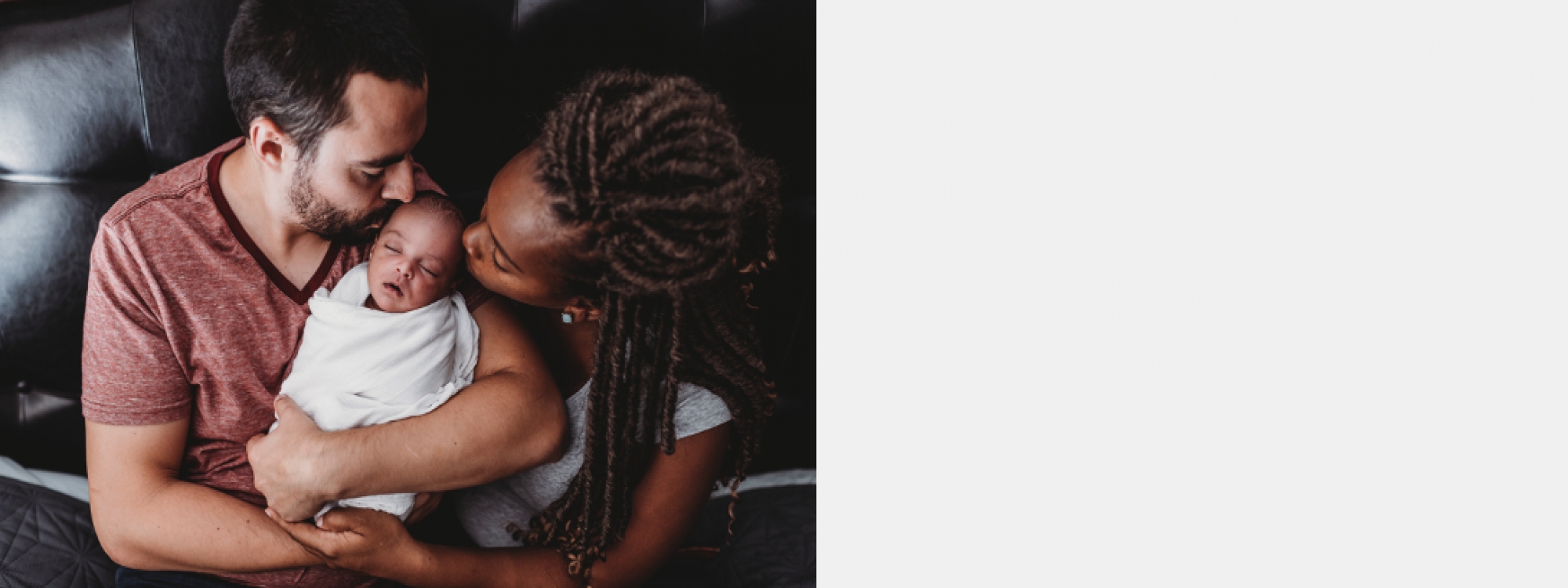
TTAC Annual Conference: Promoting 2-Generation Health during Infancy and the Perinatal Period: Synthesizing Clinical, Research, and Policy Perspectives

TTAC Webinar: Providing Mental Health Informed Care for Families Experiencing Miscarriage and Perinatal Loss
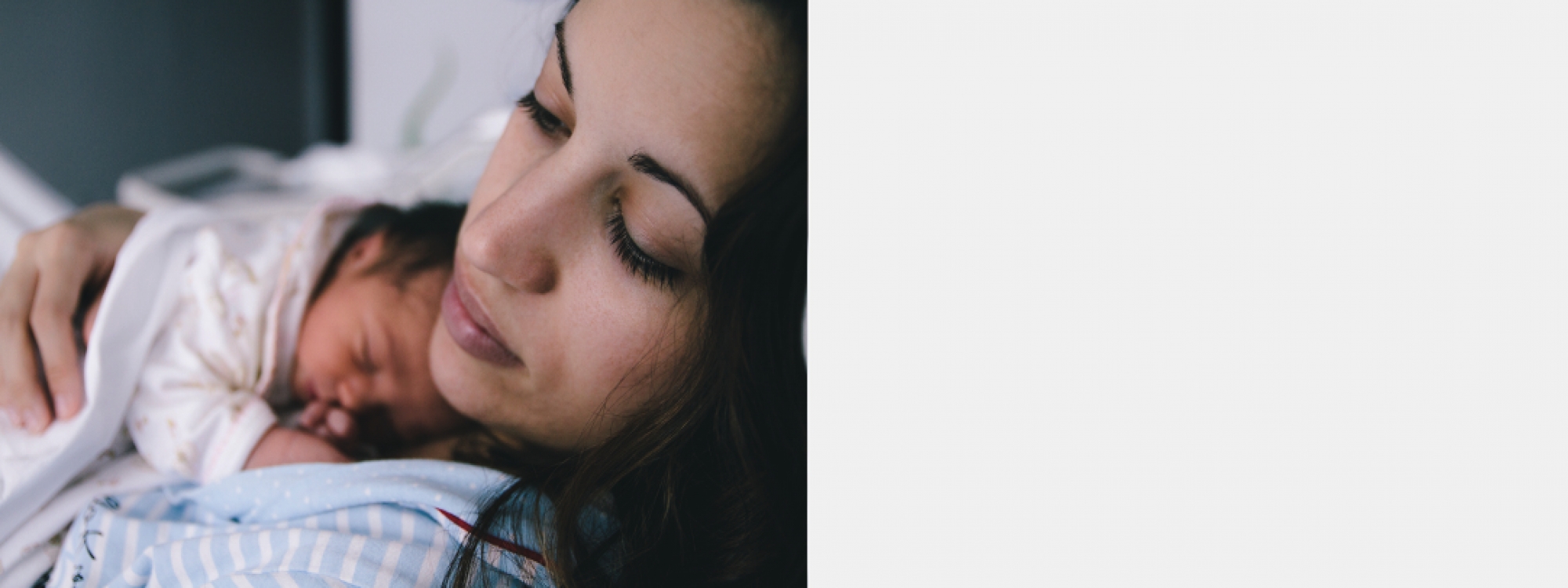
TTAC Webinar: Trauma and the Perinatal Period

TTAC Webinar: Seeing and Supporting Children with Incarcerated Parents

TTAC Webinar: Using Respectful Maternity Care to Advance Health Equity for Mother-Infant Dyads Affected by Opioid Use Disorder

TTAC Quarterly Winter Newsletter
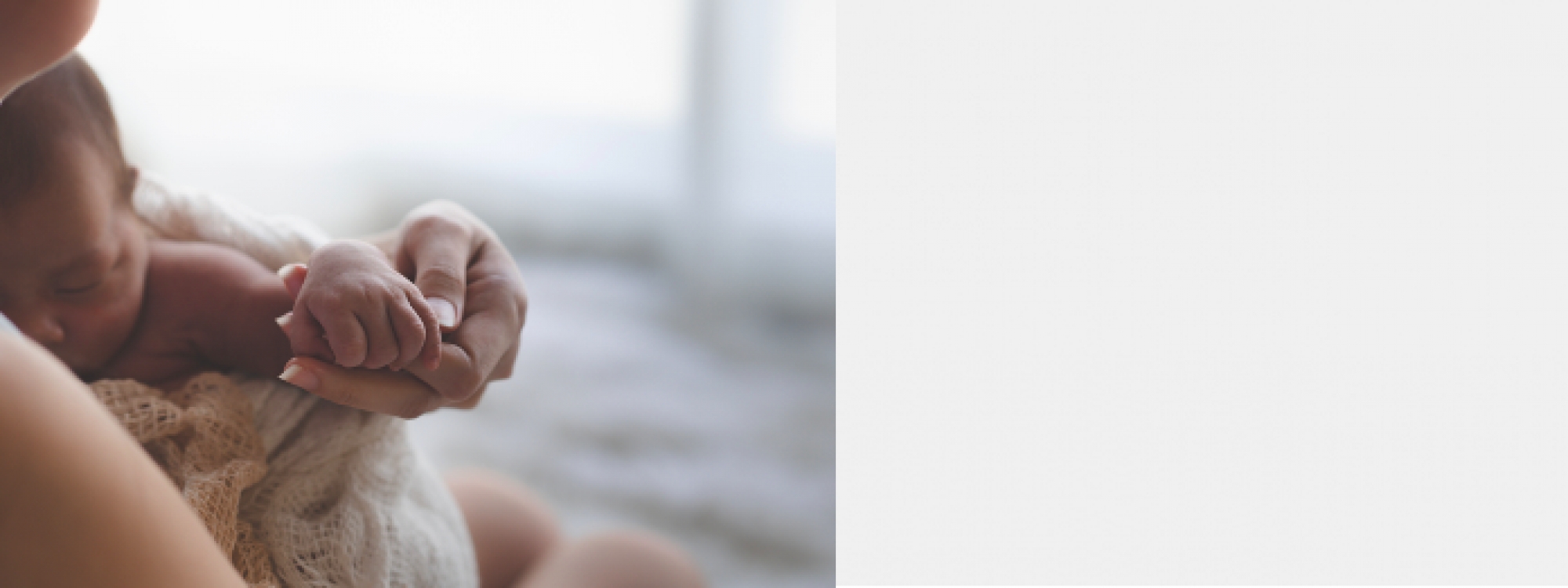
ECMH Network Perinatal Expansion

TTAC has recently launched our Early Childhood Mental Health Learning Modules
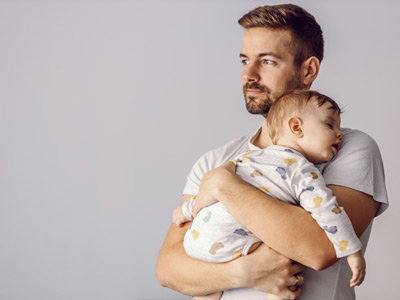
Explore this archive of exemplary trainings on essential topics in early childhood mental health designed to meet the needs of mental health professionals from entry level to advanced practitioners, as well as all professionals working with infants, toddlers and young children.
Early Childhood Poverty Tracker: Spotlight on Education; Participation in NYC’s 3-K for All Program
3-K and Pre-K programs are critical to improving equitable early childhood outcomes, especially for families living in poverty.
Contributors: Jill Gandhi, Jeanne Brooks-Gunn, Chloe Cargill, Eunho Cha, Mikayla Greeley, Matthew Maury, Kathryn Neckerman, Schuyler Ross, and Jane Waldfogel
Issues areas: education, households with children.
Early Childhood Poverty Tracker data finds that participation in New York City’s 3-K and Pre-K programs enable parents to work, pursue education, and provide enriching environments that ensure New York’s youngest have a sure step toward kindergarten readiness and future success. 3-K for All, which aims to provide every three-year-old child in New York City with free, full-day early childhood education, was rolled out in 2017. The Poverty Tracker collected data from 2017 through 2021 on how families searched for, applied, and enrolled in 3-K Programs.
Some highlights of the report include:
- Many families living in poverty want to enroll their children in 3-K programs but do not end up doing so: Families living in poverty expressed the greatest interest in applying for 3-K (64%) but had the lowest rates of enrollment (15%). Black and Latinx parents experienced greater drop-off rates between interest and enrollment, compared to white parents.
- Families who enrolled in a 3-K program had much lower childcare costs than those who did not, saving an average of $450 a month.
Related Reports
Portrait of disadvantage among women in new york city in 2022, september 2023, early childhood poverty tracker: spotlight on 3k for all and mother's labor force participation, early childhood poverty tracker: spotlight on education pre- and post covid-19, early childhood poverty tracker: poverty and hardship among families with young children before and during the pandemic.
Research & Data
Research & data.
Since 1997, the Council has been collecting state level data to identify needs and inform policy decisions to support children and families.
1997 - KIDS COUNT: The New York State KIDS COUNT project disseminates county-level data that focuses on child well-being in order to advance the use of children’s health, education and well-being indicators as a tool for policy development, planning and accountability.
2003 - KIDS WELL BEING INDICATORS CLEARINGHOUSE (KWIC): The Council launched KWIC, an interactive website that advances the NYS data dissemination process by expanding access to New York State children's health, education and well-being data.
2005 - Out of State Placement Committee: Chapter 392 of the Laws of 2005 signed into law, the Out-of-State Placement Committee which improves monitoring of out-of-state residential placements and promotes coordination across all levels of government.
Research & Data Initiatives
A primary objective of the New York State KIDS COUNT project is to disseminate county-level child well-being data as a tool for policy development, planning and accountability.
The Kids’ Well-being Indicators Clearinghouse (KWIC) provides timely access to New York State Touchstones/COUNT data through an interactive, publicly accessible website.
The Out-of-State Placement Committee created in 2005 promotes coordination across all levels of government and establishes a process for prioritizing the identification of in-state resources to support youth and their families.
Tools and Resources for Parents and Caregivers
Locate child care, after school, and home visiting programs near you.
This year’s publication continues to present national and state data across four domains — economic well-being, education, health and family and community — and ranks states in overall child well-being. The report includes pre-pandemic figures as well as more recent statistics, and shares the latest information of its kind available.
The Multiple Systems Navigator provides access to helpful health, education, human service, and disability information on one user-friendly website.
Use our mapping tool to find programs, services and family/peer support close to you. Our maps also provide driving directions, contact information and hours of operation.
CCF's Family of Websites
Access information on parenting and other helpful resources for parents and caregivers. Download the free mobile app on Google Play and App Store.
Learn about building a nurturing, health relationship with your child.
Find child care, after school, and parent support programs programs near you.
Explore careers in early childhood and school-age child care with this one-stop information source.
Access helpful health, education, human service, and disability information on one user-friendly website.
Learn about chronic absence and ways to promote school attendance.
Serves as an advisory council to the Governor on building a comprehensive and sustainable early childhood system to ensure success for all young children.
Access New York State Touchstones/KIDS COUNT data through an interactive website.
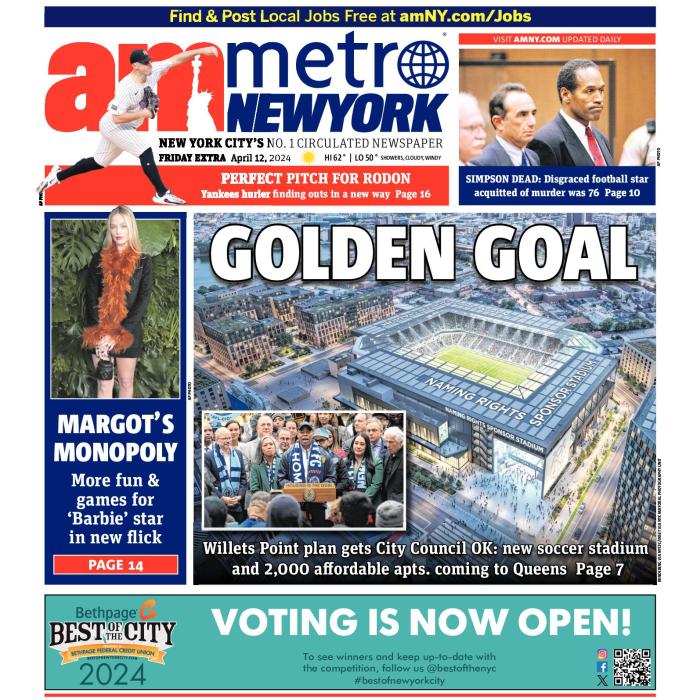
Flip through today’s papers

AMNY Newsletter
Tackle the city, with our help..
Manage your settings.

Op-Ed | Prioritizing investments in early childhood education for New York City’s economy and future

In order for families to remain in New York City and benefit from all the extraordinary things our city has to offer, they must be able to rely on early childhood education programs that support them and their children. However, a major affordability crisis, colliding with growing uncertainty in the availability of 3-K and Pre-K, threatens the ability of middle- and working-class New Yorkers to raise their families in the city they love.
The immense costs of housing and childcare have created intensifying pressures on them to depart for more affordable locations . Our city government can and must avert this drain of families from our city by safeguarding and strengthening early childhood education programs, because ultimately it is our economy, communities, and education system that will suffer.
Yet instead of investing in these programs, Mayor Adams’ administration has reduced funds for them. The mayor’s proposed budget contains another $170 million in cuts to 3-K and Pre-K , which could eliminate up to 15,000 available seats.
Cuts to these programs that provide high-quality education options for our youngest New Yorkers compromise their futures and pose critical challenges to the stability of families and New York’s economic strength.
The Council’s recently released Preliminary Budget Response prioritizes 3-K and Pre-K, highlighting that the City has the financial resources to support these vital investments. It calls for the restoration of the $170 million cut and proposes an additional $45 million to enhance the Council’s initiative to convert more 3-K slots to full-day/full-year seats that better meet the needs of working families. The Council also proposes adding $10 million to reinstate previous outreach efforts that boosted enrollment but were disbanded by this Administration, so families are aware of their options to enroll their children. When families clearly need early childhood education and we are unable to provide it, despite vacant seats, this reflects bureaucratic failure in managing the system.
3-K and Pre-K are more than social and educational initiatives; they represent a sound and proven economic strategy with enduring benefits for the city’s workforce. According to the Citizens Committee for Children, 80% of New Yorkers cannot afford child care costs, with families allocating as much as 43% of their income to center-based care alone. This diverts $6 billion in families’ disposable income. Access to universally available free programs can alleviate this affordability burden, increasing household income, spending ability, and the productivity of our workforce.
By offering reliable and affordable programs, we empower parents, particularly mothers, to fully engage in the workforce. According to the National Women’s Law Center , access to child care raises women’s labor participation rate, an especially important outcome when New York’s sits at 55.9 percent. In New York City, Robin Hood Foundation highlighted that mothers in school districts with greater 3-K availability were more likely to be in the workforce and employed full-time.
Currently, our city loses a staggering $2.2 billion in annual tax revenues due to having a workforce unable to secure reliable child car e .
It has been proven that greater public investments in early childhood education have immediate economic benefits. By adopting comprehensive and affordable early childhood education that provides a seat for every child who needs one, we can strengthen our economy.
Beyond the immediate economic benefits, early childhood education is also an investment in our city’s future generations. Studies consistently show that quality programs lead to improved academic performance, higher graduation rates, and a skilled workforce ready to meet the demands of a rapidly evolving job market. Making early childhood education a priority lays the foundation for our city having a highly educated and competitive workforce, preserving the ability to attract businesses seeking a well-educated talent pool.
The return on our investments, both immediate and long-term, far outweighs the initial financial commitment. We must view this funding not as a fiscal burden, but as a strategic investment to prevent economically diverse families from fleeing the city. In turn, we can prevent the lethal spiral of student enrollment losses causing us to lose school funding.
Rather than cutting back on these critical programs, the City must swiftly refocus the Department of Education’s lens on early childhood education, intensify outreach efforts to improve access and bolster utilization, expand full-day/full-year seats, and invest in the sustainability of quality programs.
Slashing funds for proven programs will only move our city backward, at a time when we need to strengthen family stability to sustain population levels, prioritize increased affordability, and boost our local economy. It is more pivotal now than ever that our city prioritizes funding for early childhood education to retain a talented workforce, support middle- and working-class families, and preserve all that makes New York great.
About the Author
Things to do in nyc.
Post an Event

Bingo Loco at The Brooklyn Monarch The Brooklyn Monarch

Pinocchio: A Dance/Theater Performance for Families Theatre Row

Benefits of a Plant-Based Diet: An Earth Day Conversation at Marble Church Marble Collegiate Church

Sail Away by Treehouse Shakers Ailey Citigroup Theater

Sesame Street Live! Say Hello Kings Theatre

Bluey’s Big Play Kings Theatre
View All Events…
Jobs in New York
Add your job.
- MDG Design & Construction LLC Section 3 Work Opportunity
- The 13th Child Behavior Analyst, P.C. ABA Therapist
- NY ELITE CANNABIS- NYS LEGAL ADULT USE DISPENSARY Sales Personnel/ BAYSIDE
View all jobs…

Related Articles
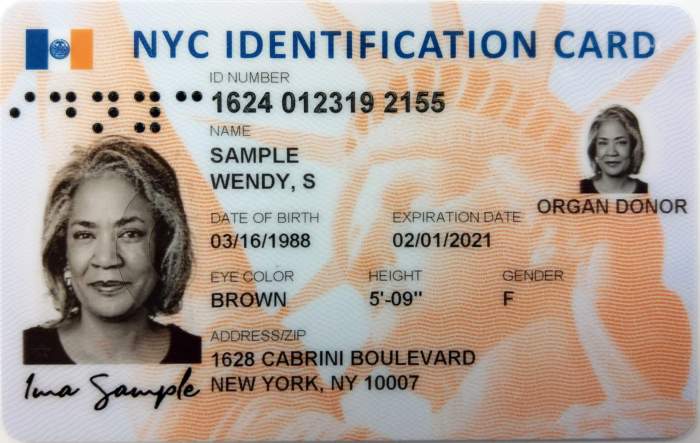
More from around NYC
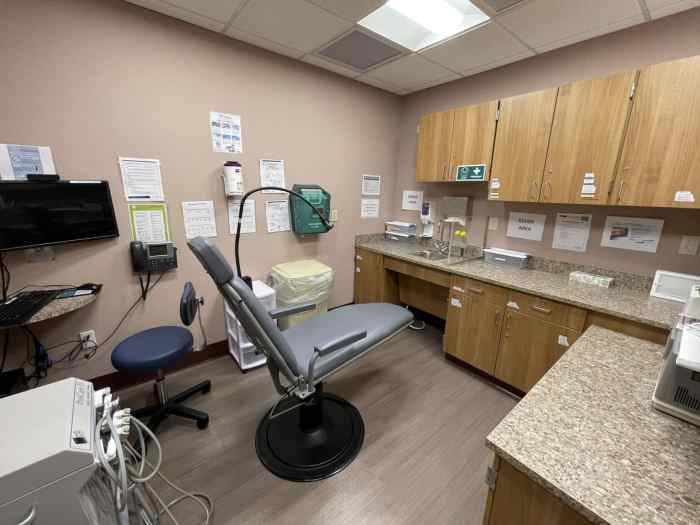
Montefiore program bringing dental care and nutrition guidance to Bronx schools
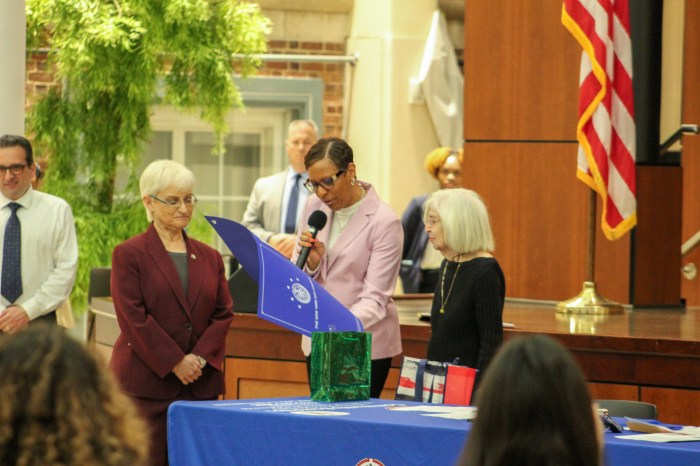
Community Board 9 honors member and Kew Gardens native for 50 years of public service
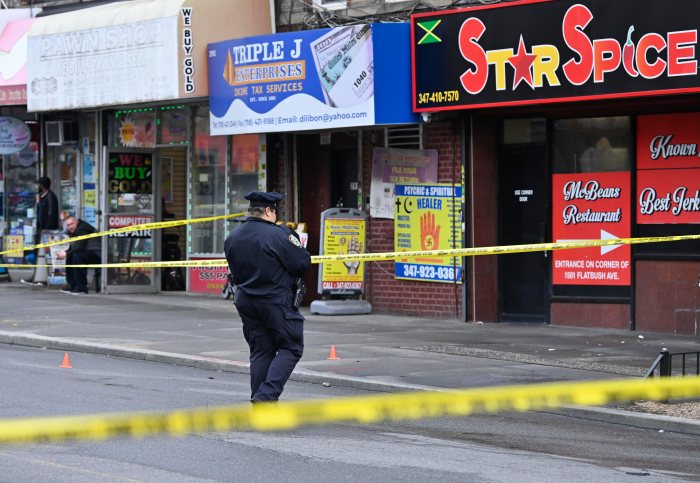
19-year-old man wounded in Flatbush shooting, cops seeking gunman who fled into subway station
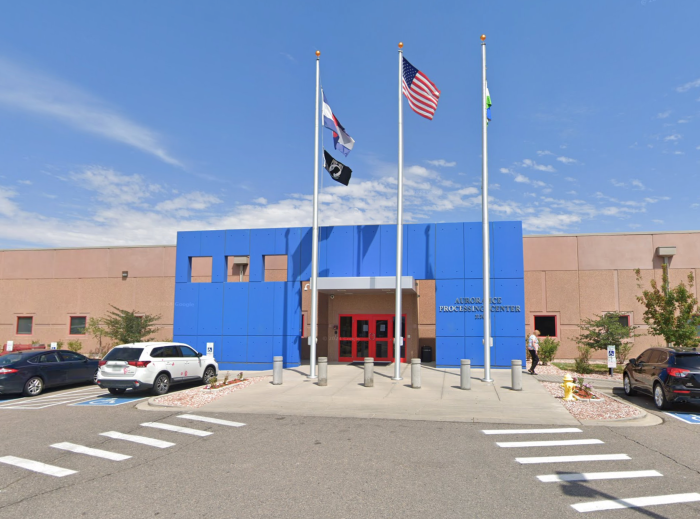
Trans and non-binary detainees accuse ICE of discrimination and mistreatment
HORIZONTV FEATURING BD+C : WATCH EPISODES ON DEMAND AT HORIZONTV
Currently Reading
Columbia university to begin construction on new york city’s first all-electric academic research building.
KPF’s design uses significantly less energy than similar buildings and supports the school’s net-zero goals.
Columbia University will soon begin construction on New York City’s first all-electric academic research building. Designed by Kohn Pedersen Fox (KPF) , the 80,700-sf building for the university’s Vagelos College of Physicians and Surgeons will provide eight floors of biomedical research and lab facilities as well as symposium and community engagement spaces.
With a design that uses significantly less energy than similar buildings, the Biomedical Research Building will outperform emission limits set by local law and is expected to perform 30% more efficiently than the commercial building benchmark. The facility also supports Columbia University’s plan to introduce no new fossil fuel infrastructure into campus buildings and to achieve campus-wide net-zero emissions by 2050.
Because laboratories have greater ventilation requirements than other buildings, they require more robust mechanical systems, which typically result in increased energy usage. The design team worked with sustainability consultant Atelier Ten to create an all-electric research lab building that could handle the facility’s high heating loads.
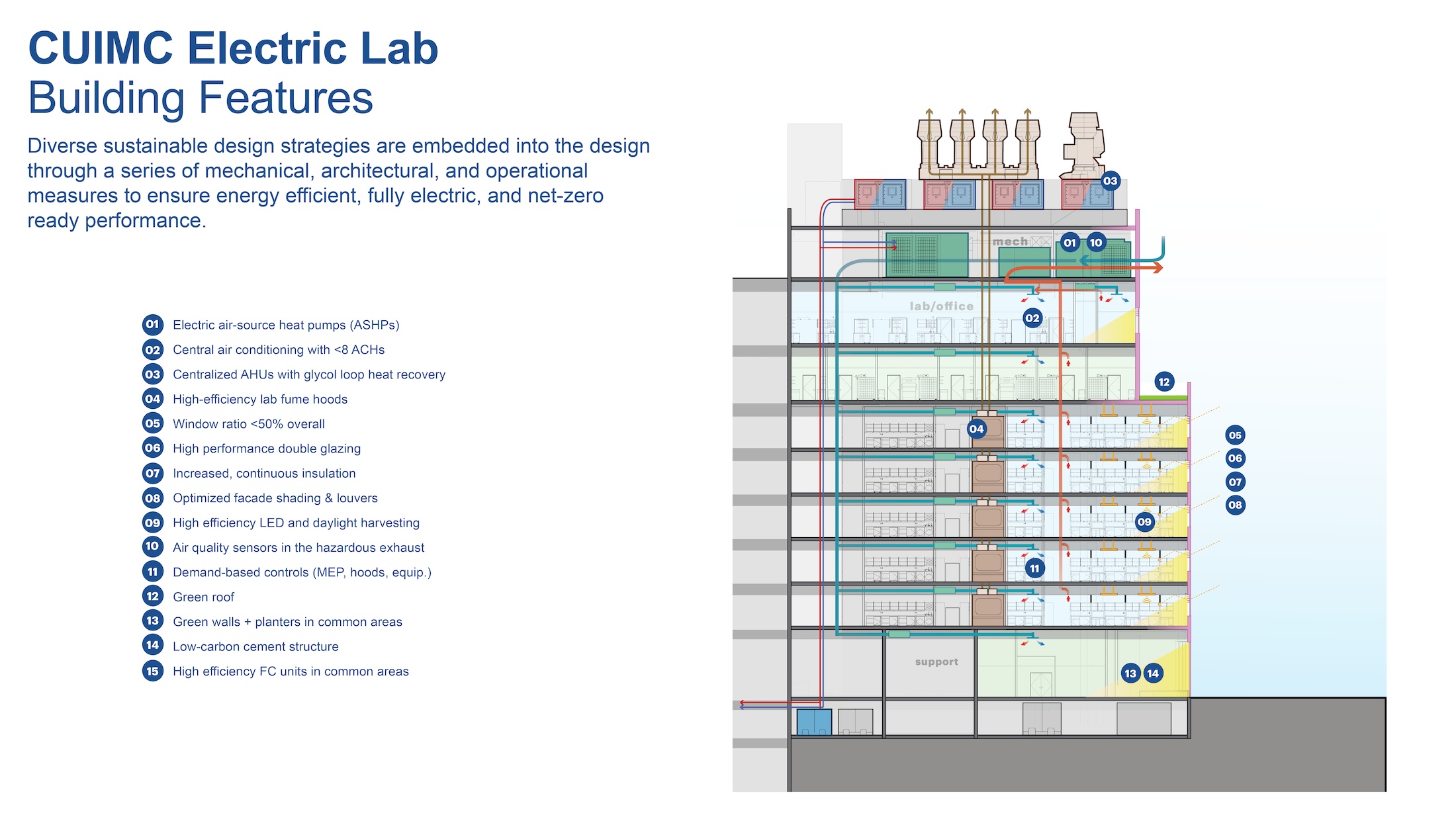
The Biomedical Research Building is heated and cooled with electric air source heat pumps that allow for energy recovery between the heating and cooling fluids, providing periods of free tempering during the year. Air-side energy recovery systems use waste heat to reduce the total energy needed to condition the building.
The high-performance façade features a window-to-wall ratio below 50%. Exterior shading and a louver system reduce solar heat gain and glare while reflecting natural light into the labs.
The building’s design integrates biophilic elements such as green walls and natural and renewable materials in collaboration spaces. A large connecting stair encourages active circulation, and corner lounges foster collaboration among researchers.
On the Building Team: Architect: Kohn Pedersen Fox (KPF) MEP engineer: AKF Group Structural engineer: Hatfield Group Sustainability consultant: Atelier Ten Lab planning consultant: Jacobs Construction manager: LF Driscoll Healthcare
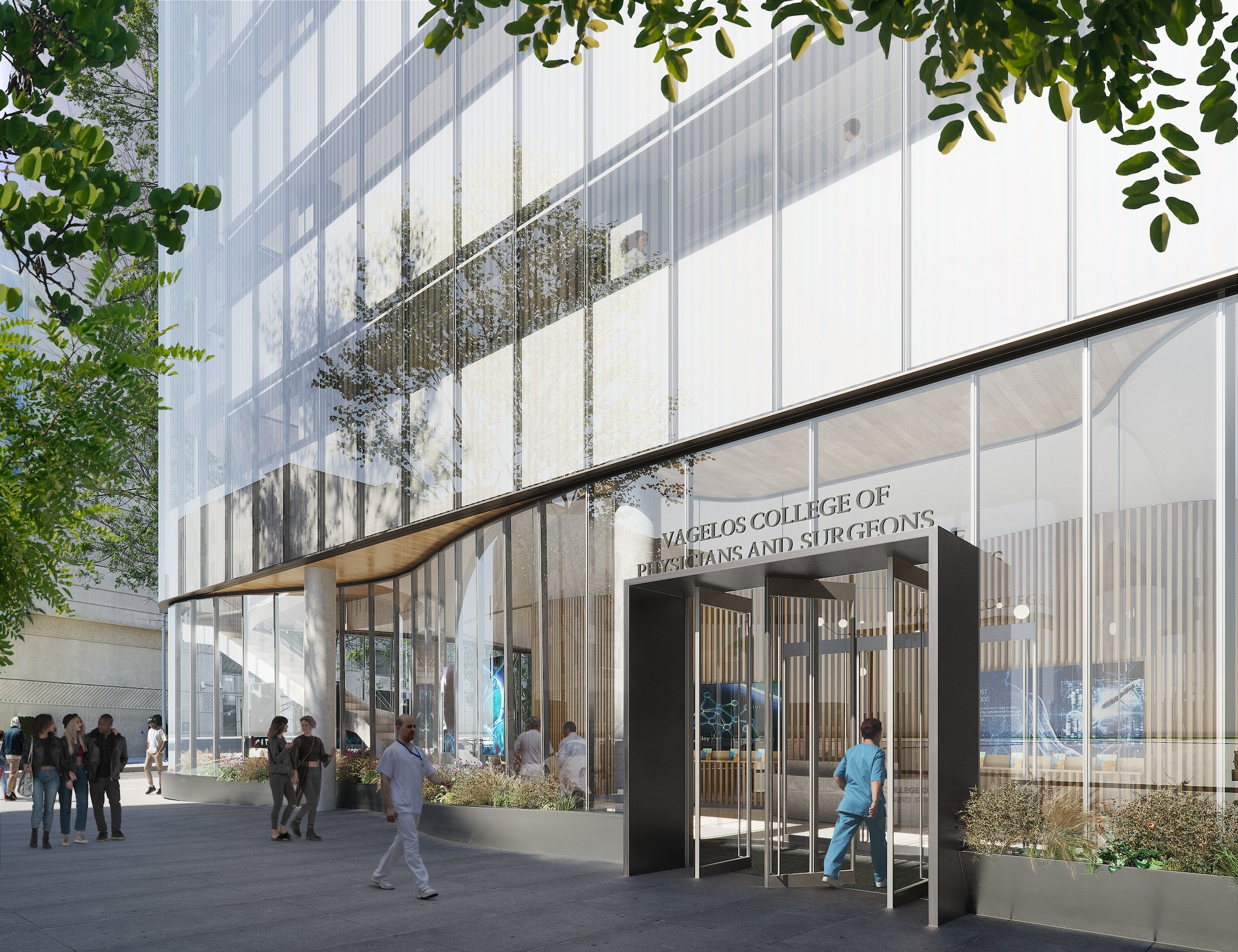
Related Stories
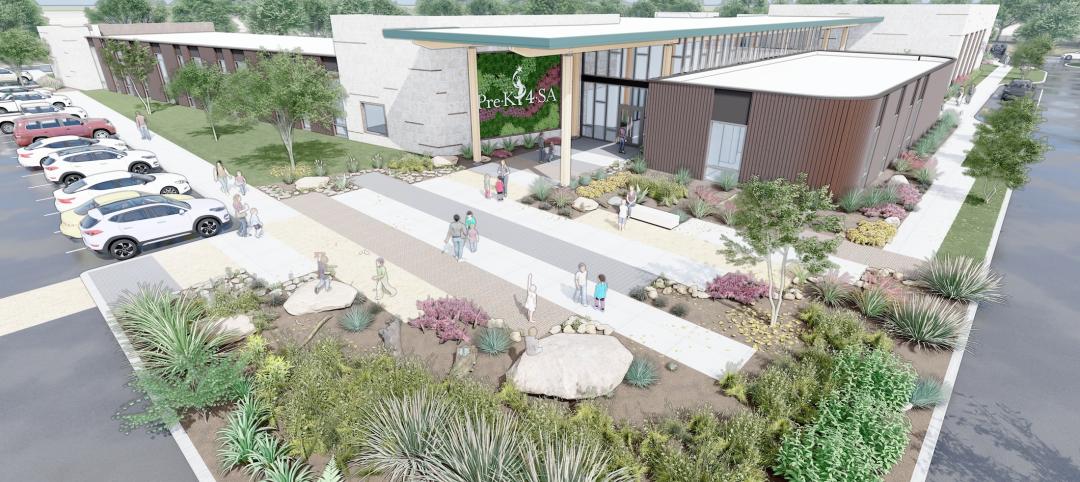
K-12 Schools | Apr 10, 2024
A san antonio school will provide early childhood education to a traditionally under-resourced region.
In San Antonio, Pre-K 4 SA, which provides preschool for 3- and 4-year-olds, and HOLT Group, which owns industrial and other companies, recently broke ground on an early childhood education: the South Education Center.
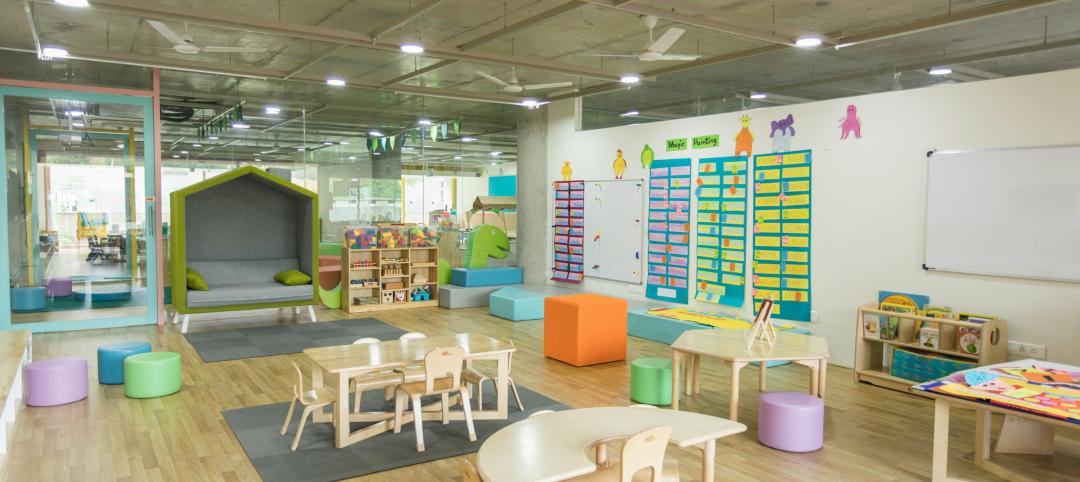
Surprise, surprise: Students excel in modernized K-12 school buildings
Too many of the nation’s school districts are having to make it work with less-than-ideal educational facilities. But at what cost to student performance and staff satisfaction?
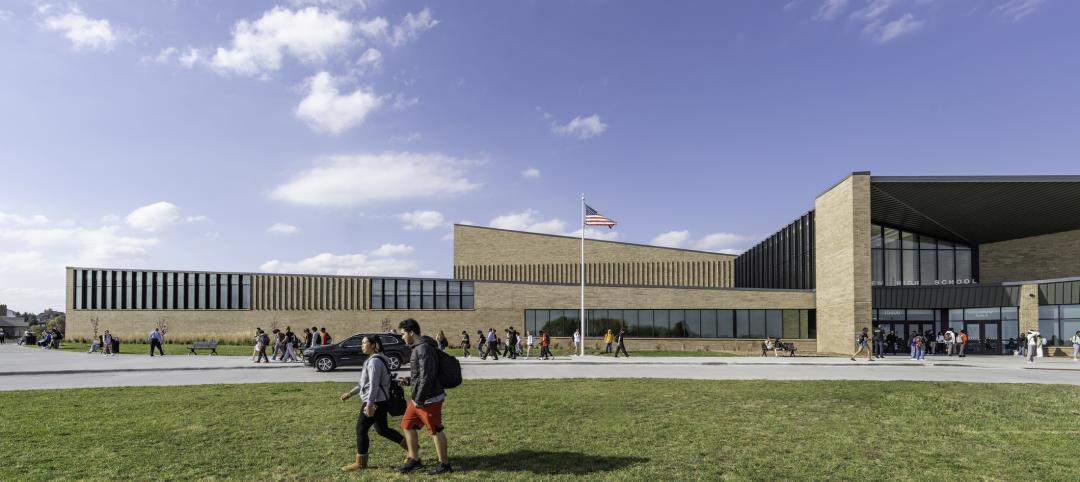
K-12 Schools | Apr 1, 2024
High school includes ymca to share facilities and connect with the broader community.
In Omaha, Neb., a public high school and a YMCA come together in one facility, connecting the school with the broader community. The 285,000-sf Westview High School, programmed and designed by the team of Perkins&Will and architect of record BCDM Architects, has its own athletic facilities but shares a pool, weight room, and more with the 30,000-sf YMCA.
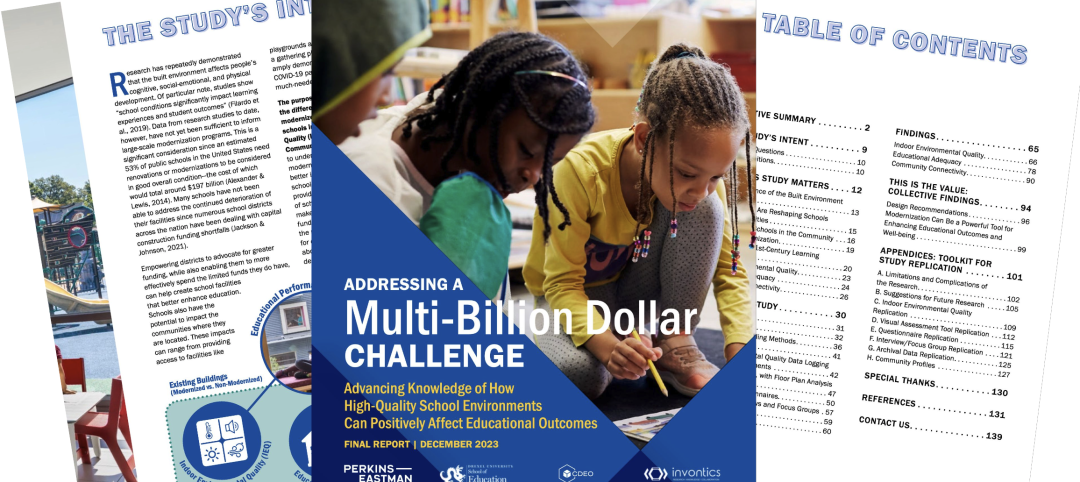
K-12 Schools | Mar 18, 2024
New study shows connections between k-12 school modernizations, improved test scores, graduation rates.
Conducted by Drexel University in conjunction with Perkins Eastman, the research study reveals K-12 school modernizations significantly impact key educational indicators, including test scores, graduation rates, and enrollment over time.
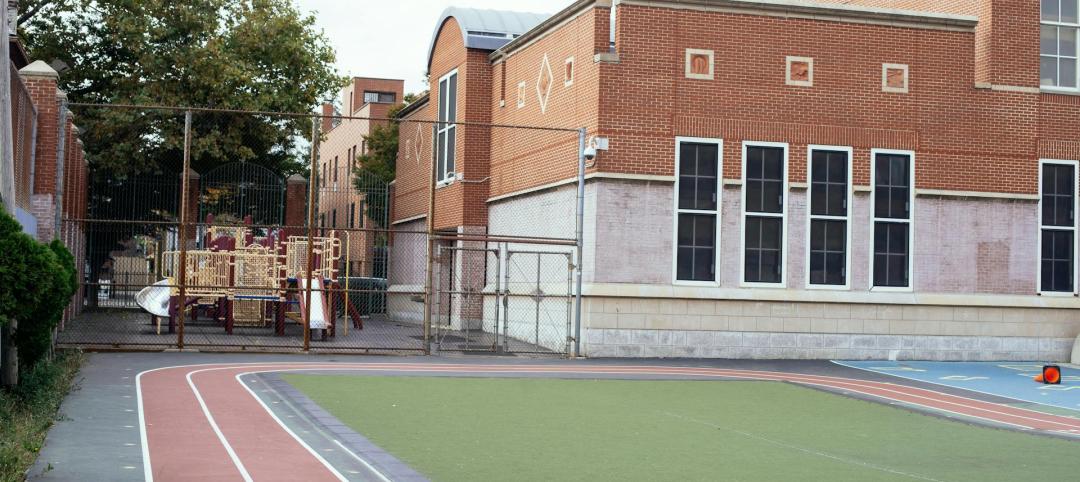
K-12 Schools | Feb 29, 2024
Average age of u.s. school buildings is just under 50 years.
The average age of a main instructional school building in the United States is 49 years, according to a survey by the National Center for Education Statistics (NCES). About 38% of schools were built before 1970. Roughly half of the schools surveyed have undergone a major building renovation or addition.
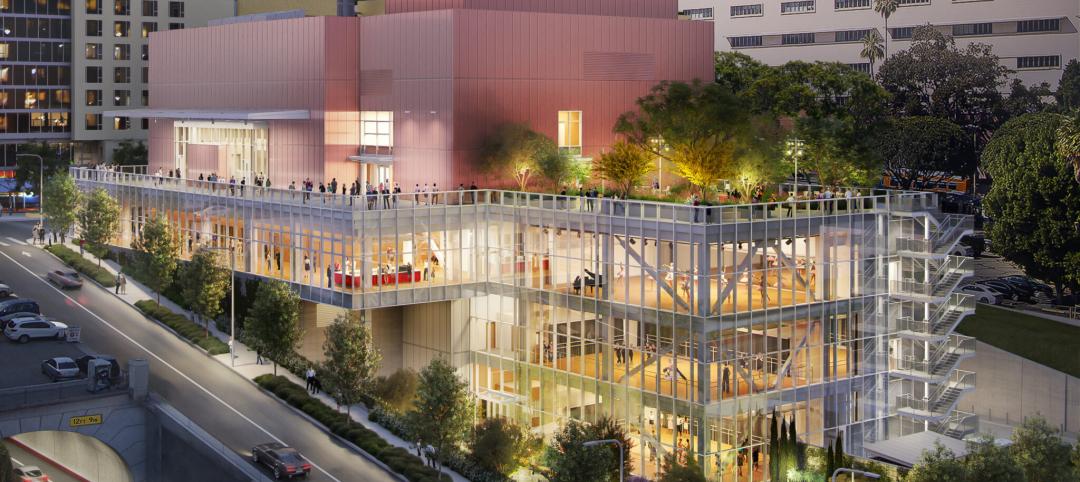
Performing Arts Centers | Feb 27, 2024
Frank gehry-designed expansion of the colburn school performing arts center set to break ground.
In April, the Colburn School, an institute for music and dance education and performance, will break ground on a 100,000-sf expansion designed by architect Frank Gehry. Located in downtown Los Angeles, the performing arts center will join the neighboring Walt Disney Concert Hall and The Grand by Gehry, forming the largest concentration of Gehry-designed buildings in the world.
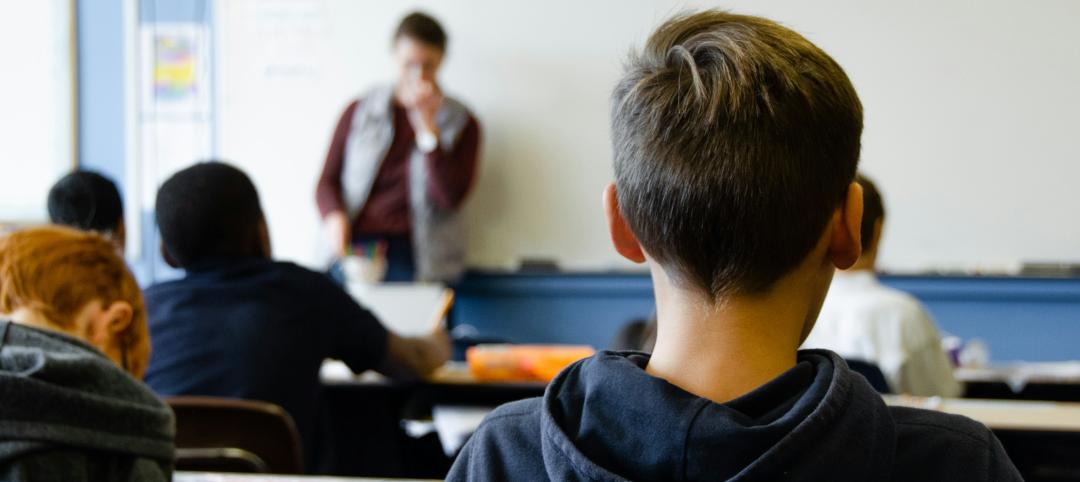
Construction Costs | Feb 22, 2024
K-12 school construction costs for 2024.
Data from Gordian breaks down the average cost per square foot for four different types of K-12 school buildings (elementary schools, junior high schools, high schools, and vocational schools) across 10 U.S. cities.
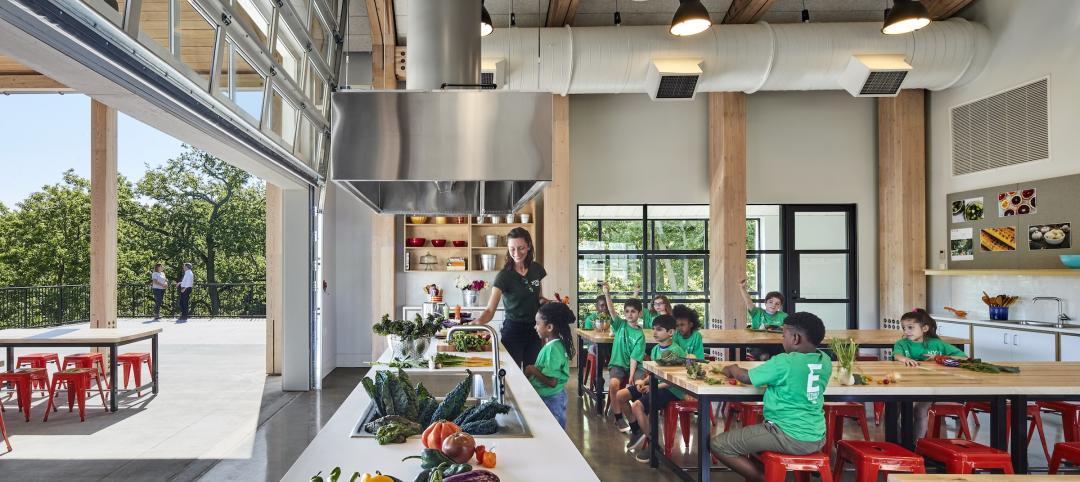
K-12 Schools | Feb 13, 2024
K-12 school design trends for 2024: health, wellness, net zero energy .
K-12 school sector experts are seeing “healthiness” for schools expand beyond air quality or the ease of cleaning interior surfaces. In this post-Covid era, “healthy” and “wellness” are intersecting expectations that, for many school districts, encompass the physical and mental wellbeing of students and teachers, greater access to outdoor spaces for play and learning, and the school’s connection to its community as a hub and resource.
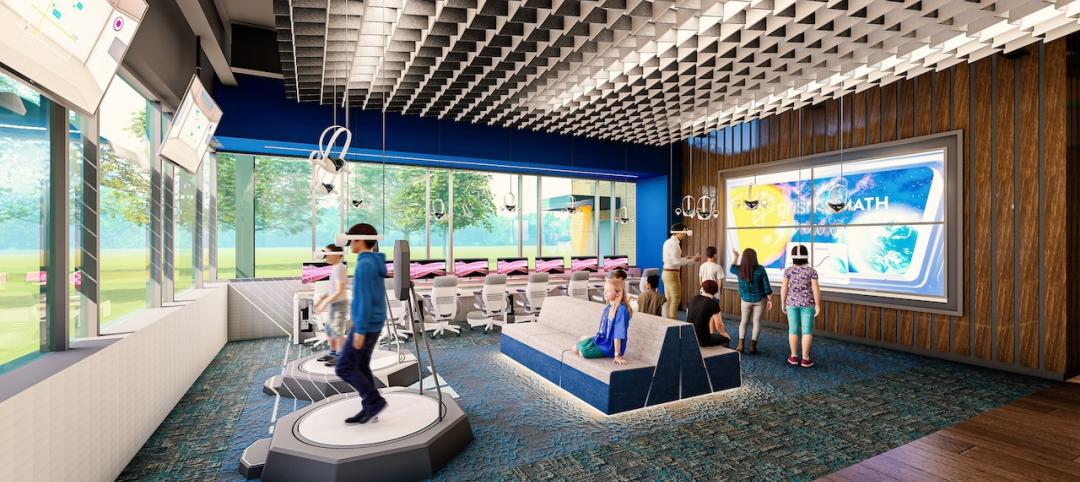
K-12 Schools | Jan 25, 2024
Video: research-based design for k-12 schools.
Two experts from national architecture firm PBK discuss how behavioral research is benefiting the design of K-12 schools in Texas, Florida, and other states. Dan Boggio, AIA, LEED AP, NCARB, Founder & Executive Chair, PBK, and Melissa Turnbaugh, AIA, NCARB, Partner & National Education & Innovation Leader, PBK, speak with Robert Cassidy, Executive Editor, Building Design+Construction.

Industry Research | Jan 23, 2024
Leading economists forecast 4% growth in construction spending for nonresidential buildings in 2024.
Spending on nonresidential buildings will see a modest 4% increase in 2024, after increasing by more than 20% last year according to The American Institute of Architects’ latest Consensus Construction Forecast. The pace will slow to just over 1% growth in 2025, a marked difference from the strong performance in 2023.
Top Articles
Mfpro+ news, greystar becomes top apartment owner, manager, and developer in 2024, construction costs, construction materials prices increase 0.4% in march 2024.
- K-12 Schools
More In Category
Most popular content.
- BD+C University (CEUs)
- MultifamilyPro+
- Giants 400 Rankings
- Life of an Architect
Building Sector Reports
- Airport Terminals
- Data Centers
- Government Buildings
- Healthcare Facilities
- Hotel Facilities
- Industrial Facilities
- Justice Facilities
Building Sector Continue
- Laboratories
- Military Construction
- Modular Building
- Multifamily Housing
- Office Building Design
- Performing Arts Centers
- Religious Facilities
- Retail Centers
- Senior Living Facilities
- Sports and Recreational Facilities
- Transportation & Parking Facilities
- University Buildings
- Burns & McDonnell
- CallisonRTKL
- CannonDesign
- Clark Nexsen
- CO Architects
- Design Collaborative
- FXCollaborative
- Gresham Smith
Blogs Continue
- HMC Architects
- IA Interior Architects
- Kimley-Horn
- Legat Architects
- NAC Architecture
- Nadel Architecture & Planning
- Perkins and Will
- Perkins Eastman
- Rider Levett Bucknall
- Shepley Bulfinch
- Southland Industries
- SRG Partnership
- Ted Goldstein, Atlas Tube
- Vessel Architecture & Design
- Walter P. Moore
Building Team Reports
- Contractors
- Building Owners
- BD+C University
- Building Enclosures Series
- Case Studies
- Codes and Standards
- COVID-19 Reports
- Native Series
- Press Releases
- White Papers
BD+C Awards Programs
- 75 Top Products
- 40 Under 40
- Women in Design+Construction
- See all events
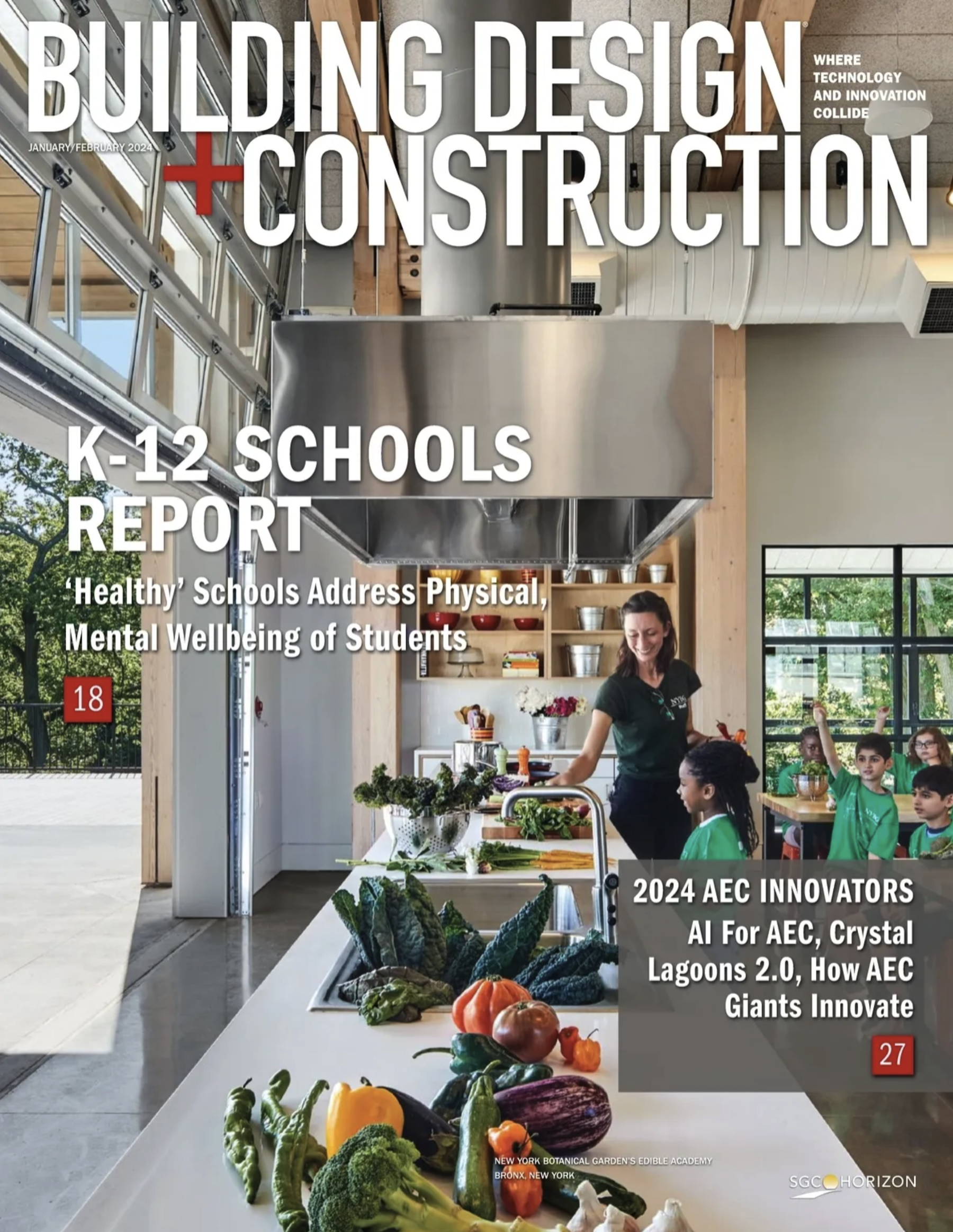
Magazine Subscription
Get our newsletters.
Each day, our editors assemble the latest breaking industry news, hottest trends, and most relevant research, delivered to your inbox.
Follow BD+C:

IMAGES
COMMENTS
New York City's home for early childhood research and policy. Go to Projects. Go to Resources. News & Announcements. Lindsey Bravo: New Research Network Director. ... NYC Early Childhood Research Network. 16 Court Street, 31st Floor, Brooklyn, NY 11241 p: (718) 254-7353 | [email protected]
NYC Early Childhood Research Network. The NYC Early Childhood Research Network (Network) was established to bring representatives from New York's City agencies and researchers in the New York City metropolitan area together to consider key research questions to benefit programs and policies serving children from birth through age 8.
Reflections by Research Network Scholars: Jillian Crosby August 31, 2021 December 11, 2023 5 Comments. The New York City Early Childhood Research Network is a project of the New York Early Childhood Professional Development Institute.
All partners have a track record of working with New York City's early childhood system. Currently, the Research Network includes senior scholars and junior researchers from the following thirteen institutions, listed alphabetically: Bank Street College of Education. Borough of Manhattan Community College, City University of New York.
The New York City Early Childhood Research Network (the Research Network) was established in 2015 to bring researchers and policymakers together to investigate and improve early childhood program quality in New York City. The Research Network is committed to generating actionable research and timely data to help City officials with the ...
At the New York City Early Childhood Research Network, we bridge research, policy, and practice by providing actionable insights to improve early care and education quality. This type of collaboration facilitates research for impact and action; research to inform policy and practice (Penuel & Hill, 2019). We are pleased to announce the Research Network's video catalog. These quick videos ...
We are excited to share the launch of two new projects made possible by the generous support of the Heising-Simons Foundation.. Promoting Teacher-Child Relationships in Early Care and Education Classrooms-The National Center for Children in Poverty and The Straus Center, Bank Street College of Education have launched a teacher-research partnership project that will address empirical gaps in ...
The New York Early Childhood Professional Development Institute, which facilitates the Research Network, has secured new funds for research focused on the NYC workforce that supports children from birth through age three. In New York City, the infant and toddler workforce is vast. Our youngest children are routinely cared for in a wide variety ...
New York City Early Childhood Research Network . In 2014, the Foundation for Child Development committed an initial $2 million as part of President Obama's Invest In Us effort to galvanize philanthropic investment in early childhood. The purpose of the investment is ... New York City Early Childhood Research Network was formed .
Building a collaborative, multidisciplinary research network supports the implementation of effective programs by enabling researchers and policy makers set mutual goals, define shared metrics and protocols, collect meaningful data, and share various perspectives and learnings, a report from the Foundation for Child Development argues. The report, The New York City Early Childhood Research ...
Published on February 8, 2019 by Alyssa Estremo. We are thrilled that the New York City Early Childhood Research Network was recently accepted to become a member of the National Network of Education Research Practice Partnerships ( NNERPP ). NNERPP supports a professional learning community of researchers and policymakers located throughout the ...
The New York City Early Childhood Research Network is a project of the New York Early Childhood Professional Development Institute. The Network brings together researchers, practitioners, and policymakers to collaborate, share knowledge, and generate actionable research.
295 Madison Avenue, 40th Floor, New York, NY 10017 | T 212.867.5777 | www.fcd-us.org Introducing the NYC Early Childhood Research Network: Establishing a Model for Integrating Research, Policy, and Practice New York, NY (February 27, 2018) - While plenty of attention has been paid to the effectiveness of early
Seeking to close this gap, the Foundation for Child Development (the Foundation) has released its latest report "New York City Early Childhood Research Network: A Model for Integrating Research, Policy, and Practice," highlighting the New York City (NYC) Early Childhood Research Network (the Network).
Much attention has been paid to examining the effectiveness of early care and education (ECE) programs. Yet, little research examines how to implement such programs and help policymakers utilize research to inform on-the-ground operations in real time. This has left researchers conducting studies in silos, schools and programs applying for funding with distinct and varying mandates, and ...
The project would not have been possible, however, without the support of the New York City Early Childhood Research Network, a unique partnership between researchers from eight higher education institutions and four city agencies to answer important questions about early-childhood education in New York City. Directors from local programs have ...
This project was supported by The New York City Early Childhood Research Network through funding provided by the Heising-Simons Foundation.In addition, it was a research-policy-partnership project with one of the Research Network's policy partners - NYC Public School's Division of Early Childhood Education (DECE). The NYU research team includes Rachel Abenavoli (Ph.D.) Jessica Siegel (Ph ...
Training. Explore this archive of exemplary trainings on essential topics in early childhood mental health designed to meet the needs of mental health professionals from entry level to advanced practitioners, as well as all professionals working with infants, toddlers and young children. Learn More.
Early Childhood Poverty Tracker data finds that participation in New York City's 3-K and Pre-K programs enable parents to work, pursue education, and provide enriching environments that ensure New York's youngest have a sure step toward kindergarten readiness and future success. 3-K for All, which aims to provide every three-year-old child in New York City with free, full-day early ...
Research & Data. Since 1997, the Council has been collecting state level data to identify needs and inform policy decisions to support children and families. 1997 - KIDS COUNT: The New York State KIDS COUNT project disseminates county-level data that focuses on child well-being in order to advance the use of children's health, education and ...
295 Madison Avenue, 40th Floor, New York, NY 10017 | T 212.867.5777 | www.fcd-us.org New York City Early Childhood Research Network In 2014, the Foundation for Child Development committed an initial $2 million as part of President Obama's Invest in US effort to galvanize philanthropic investment in early childhood.
In New York City, Robin Hood Foundation highlighted that mothers in school districts with greater 3-K availability were more likely to be in the workforce and employed full-time.
In San Antonio, Pre-K 4 SA, which provides preschool for 3- and 4-year-olds, and HOLT Group, which owns industrial and other companies, recently broke ground on an early childhood education: the South Education Center. Slated for completion by summer 2025, the South Education Center aims to provide access to high-quality early childhood education for the southeast side of San Antonio—a ...
Columbia University will soon begin construction on New York City's first all-electric academic research building. Designed by Kohn Pedersen Fox (KPF), the 80,700-sf building for the university's Vagelos College of Physicians and Surgeons will provide eight floors of biomedical research and lab facilities as well as symposium and community engagement spaces.